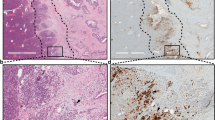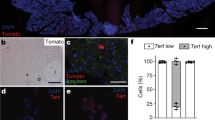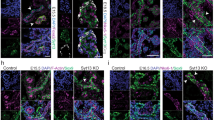Abstract
THERE are present in the Golgi zone of each acinar cell of the mammalian pancreas a number of small lipoidal droplets (about 1½µ in diameter) which stain with methylene blue and other vital dyes. Each lipochondrion, or, where vesiculated, its cortex, is intensely osmiophilic and concentrates vital dyes1. Hirsch2, and later Baker3 and Lacy4, considered that the prozymogen granules arose within the vacuolated lipochondria and when mature (1½µ in diameter) were released into the apical part of the cell.
This is a preview of subscription content, access via your institution
Access options
Subscribe to this journal
Receive 51 print issues and online access
$199.00 per year
only $3.90 per issue
Buy this article
- Purchase on Springer Link
- Instant access to full article PDF
Prices may be subject to local taxes which are calculated during checkout
Similar content being viewed by others
References
Xeros, N., Nature, 167, 448 (1951).
Hirsch, H. C., “Form und Stoffwechsel der Golgi-Korper”. Protoplasma Monographs (Borntraeger, Berlin, 1939).
Baker, J. R., Quart. J. Micro. Sci., 90, 293 (1949).
Lacy, D., Nature, 175, 302 (1955).
Worley, L. G., J. Morph., 261, 75 (1944).
Author information
Authors and Affiliations
Rights and permissions
About this article
Cite this article
XEROS, N. Zymogen Formation in the Mouse Pancreas. Nature 177, 843–844 (1956). https://doi.org/10.1038/177843a0
Issue Date:
DOI: https://doi.org/10.1038/177843a0
Comments
By submitting a comment you agree to abide by our Terms and Community Guidelines. If you find something abusive or that does not comply with our terms or guidelines please flag it as inappropriate.



